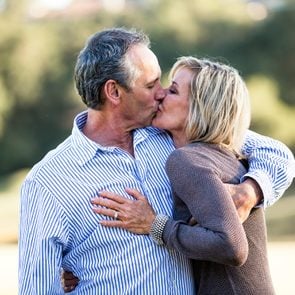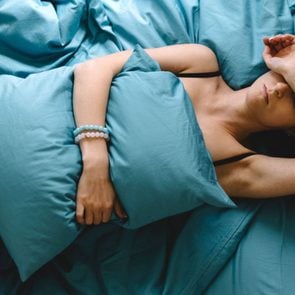1 in 10 Women Has This Sexual Disorder—and Doesn’t Even Know It
Updated: Mar. 04, 2024
Can't get excited about sex with your partner? It might be because of this underdiagnosed condition.
“Hypoactive sexual desire disorder (HSDD) is a common form of sexual dysfunction when women have no or a low desire to have sex and it causes distress,” says Lauren Streicher, MD, founder and medical director of the Northwestern Medicine Center for Sexual Medicine and Menopause. HSDD can have both physical and psychological causes.
Conservative estimates say that 10% of women have HSDD, but some research suggests the condition is underdiagnosed and affects closer to 33% of women, says Heather L. Beall, MD, a gynecologist at Northwestern Medicine McHenry Hospital.
What are the causes of hypoactive sexual desire disorder?
While there are numerous potential contributors to HSDD, experts agree that there are also many potential solutions. First, these are the things that may trigger HSDD.
You’re on birth control
Some women taking birth control find that their arousal and their ability to orgasm dip when they’re on the pill, says Dr. Beall. Talk to your doctor about other birth control options.
‘What’s the Best Birth Control for Me?’ The 7 Methods OB/GYNs Currently Want You to Know About
You’re on antidepressants
Antidepressants can inhibit your sex drive and ability to orgasm, and it’s a side effect not often discussed. About one in eight Americans over age 12 takes antidepressants, according to the Centers for Disease Control and Prevention (CDC). “They may not realize the impact it can have on [their] sex drive,” says Dr. Beall. Talk to your doctor about alternative antidepressant medications that may not affect you this way.

You’re closing in on menopause
“I would say 90% of perimenopausal women have decreased sexual desire,” says Dr. Beall. It can be a huge problem if this does not match the desire of your partner, according to Dr. Bell. Other signs of perimenopause can include dry skin, sleepless nights, and clumsiness.
What Is Vaginal Atrophy? Women’s Doctors Explain
You’re post-menopausal
Age has a lot to do with your lowered libido. Your estrogen levels drop as you age, according to the U.S. National Library of Medicine. That may lower your desire and increase vaginal dryness.
You’ve had traumatic experiences in the past
“[HSDD] can stem from past trauma,” says Dr. Streicher. “Either molestation, rape, or perhaps being brought up in a very religious atmosphere where sex was deemed bad. It’s usually not about not liking sex, and it doesn’t happen with just one sexual partner, but all.” HSDD used to be in the American Psychiatric Association’s Diagnostic and Statistical Manual of Mental Disorders; it has since been lumped together with another syndrome as sexual interest/arousal disorder.
I Tried It: How Trauma-Informed Dance Therapy Helped Me Love My Body Again
Sex is painful for you
One cause of HSDD may be painful sex, creating fear or an aversion to having sex. “Women with endometriosis, pelvic inflammatory disease, or other infections may have painful intercourse,” says Dr. Streicher. It’s important to see your gynecologist to treat any preexisting conditions or to discuss when sex starts to become painful—don’t accept this as normal.
Sex in Your 40s: 13 Things You Should Know

How to treat hypoactive sexual desire disorder
There are various ways to treat HSDD. First, the key is to find out the underlying cause. If an antidepressant or other medication is affecting your sex drive, your doctor may be able to change your prescription or your dosage.
Dr. Beall often suggests vaginal estrogen, especially for postmenopausal women. “Decreased sexual desire and dryness is a recipe for never having sex again,” she says. “As women age, we experience a lot of vaginal dryness. You don’t self-lubricate like you used to.” She recommends her patients use a vaginal estrogen cream twice a week. “It will give you a sense of being younger, and that your vagina still works the way that it used to,” she says.
Your gynecologist also may refer you to a sex therapist or behavioral therapist. “There are sex therapists that specifically deal with HSDD. Talk therapy may also help treat HSDD,” says Dr. Streicher. Therapists can help women get through the day-to-day HSDD struggles and deal with past trauma. They may also prescribe medication to help manage anxiety related to HSDD.
The drug Addyi (flibanserin) has been approved by the FDA to treat HSDD. It has been nicknamed “the female Viagra” because it increases sexual desire or response. It does have some limiting factors, though: “Women cannot drink alcohol while on it, and it is not for women who have already gone through menopause,” says Dr. Beall.
The injectable medication Vyleesi (bremelanotide) has also been FDA-approved to treat HSDD in premenopausal women. You give the shot to yourself when you need it. Side effects can include headache, nausea, and pain at the injection site.













